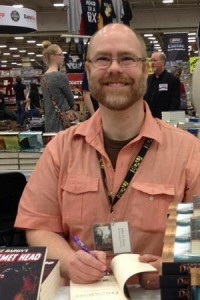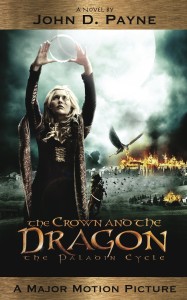A guest post by John D. Payne
I was single for a long time, and not by choice. I was sick of dating by the time I was 21, but wasn’t married until 36. It took me 15 years to get noticed at a party by a beautiful, funny woman who shares my love of Firefly and tolerates my love of that greatest of all Canadian contributions to the culinary arts: poutine.
What had I done to catch the eye of my own personal Princess of Power? Well, aside from riding a sweet tiger to the party and looking great in furry briefs, I had managed to figure out two important truths. First, finding a partner isn’t about trying to figure out what someone else can offer me (such as an escape from the meat market singles scene), but about becoming the kind of person that has something to offer to someone else. Second, a smile is sexier than a mope. (Sorry, Team Edward.)
A lot of getting noticed as an author is about these same changes in attitude.
Consider conventions, like the recent Dallas Fan Expo. I go to these shows to sell books. But if I get focused on the numbers, then I don’t sell well. My smile becomes strained and I start to look as desperate as I feel. If people notice me when I’m in that frame of mind, they’re going to do everything they can to avoid my gaze and escape before I can even open my mouth. That kind of treatment makes anybody feel lousy, so pretty soon I’m viciously cycling. No good.
For me, the cure is to remember that I really do love sharing great stories. Whether they’re mine or not, I really enjoy introducing someone to a book they’re going to love. So instead of pushing my book to every single person I talk to, I actually listen to what they say when I ask them what they like to read, and then try to make a recommendation that will really knock their socks off. In no time flat, I’m enjoying myself again. And my book usually end up flying off the table along with all the others I’m recommending.
Thinking about what I have to offer others is not just a great way to get noticed at conventions. My book was recently included in an ebook bundle. Part of the reason I think they included me was that the curator has seen me promoting other people’s books on my Facebook page.
(By the way, if you haven’t checked this out, do yourself a favor. Fifteen bucks gets you thirteen books, including fantastic novels by Cat Rambo, Paolo Bacigalupi, Tobias Buckell, and many others.)
Another important shift in attitude for me has been switching from a default assumption of failure to one of success. In dating, I used to go into relationships with the thought that most of them fail. That’s true, statistically speaking. But I was a lot happier once I started assuming that each new relationship would be the one that would last a lifetime. Looking for reasons to stay in, instead of a justification for bailing out, helped me see a lot more good not just in others but in myself. And eventually I was right.
I try to approach opportunities in my writing career the same way. Four years ago this summer I got an email from an old writing group buddy who made indie fantasy and scifi films. They wanted to release a book and a movie at the same time as an experiment and wondered if I would like to write the novel to go with the film.
It was an intriguing possibility, but I already had plans that summer to change jobs, move (twice), get married, finish writing my dissertation, defend it, and revise it. So I said… Sure! And then we talked about particulars and hammered out a schedule and a contract that we could all live with. In other words, I looked for ways to make it work instead of excuses to stay out.
When I start by assuming that failure is the likely result, I am nearly always right. But being part of a self-fulfilling prophecy is not as satisfying as it sounds. On the other hand, when I start by assuming that there’s a path to success, I am not always right. (Or at least I don’t always find that path.) But often great things happen. And every now and then, something truly miraculous happens. Like the day my wife noticed me at a party, and every day we’ve been together since then.


